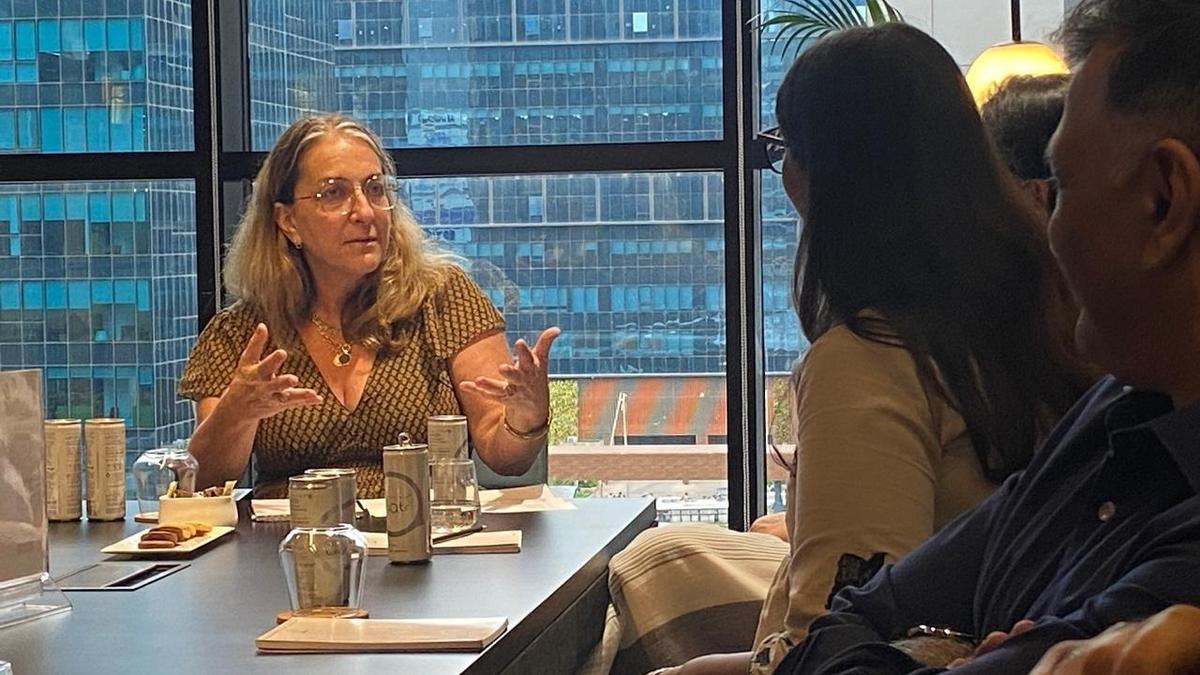
“The independent film movement in India is in a nascent stage. I see an opportunity for growth,” states Caroline Libresco, a distinguished US-based film curator and creative producer. During a brief interaction at American Corner, St Francis College for Women, Hyderabad, Libresco shared insights on galvanizing the independent film sector in India, especially focusing on female filmmakers.
With previous interactions under her belt, having conversed with students and independent filmmakers in Chennai and Thiruvananthapuram, Caroline is set on a mission. Her objective is to encourage women independent filmmakers in both feature-length and documentary categories to enhance their project pitching and development skills, and to find financial support. Libresco’s Indian tour will also include discussions with filmmakers from New Delhi, promising to be a noteworthy journey of enlightenment and inspiration.
Caroline brings a wealth of experience, having served nearly two decades as one of the head programmers at the Sundance Film Festival, up until 2019. Additionally, she directed the Sundance Women’s Initiative from 2012 to 2019 and was the founding director of Sundance Catalyst from 2013 to 2019. Through these initiatives, she played a pivotal role in building a robust community of over 100 financiers, aiding the fundraising of more than $31 million for 89 films. Among the notable films she has supported are Writing with Fire, Truffle Hunters, Crip Camp, Won’t You Be My Neighbor, and The Witch.
When discussing her sessions with students and filmmakers in India, Caroline emphasized that addressing issues related to project development and assisting filmmakers in pitching their stories more compellingly were the primary goals. Additionally, she highlighted the necessity of effective networking and securing adequate financial support as crucial areas of focus.
Reflecting on the conception of the Sundance Women’s Initiative, Libresco notes that the 2000s and 2010s were transformative periods for the American independent film movement. “In 2010-11, we had a hunch that women were not fairing well in Hollywood and the independent film space,” she recalls. “We had to identify obstacles and address them; for that, research was essential because one cannot argue with evidence.
.”
To substantiate their intuitions, a study was conducted in collaboration with researchers at USC Annenberg, led by Stacy L. Smith. The study aimed to identify the specific challenges faced by independent women directors and producers. “Based on the findings, we tailored our program to address significant issues related to financing and male-dominated networks,” says Caroline. They discovered that there was often a long gap between the first and second films for women directors, unlike their male counterparts who produced films in quick succession.
Programs were meticulously designed to bridge this gap by bringing together high net-worth individuals capable of financing films and women filmmakers who were in dire need of financial backing. Caroline’s initiatives have thus provided vital support and cultivated a more inclusive environment for women in the film industry.
Libresco stresses that systemic changes are paramount to providing equitable opportunities for women in cinema on a larger scale. In India, her optimism is buoyed by the leadership of film producer Guneet Monga, who has been leading the Women in Film India chapter, an initiative aimed at paving the way towards gender equity in the Indian film industry.
Her hands-on approach in interacting with Indian filmmakers is aimed not only at enriching their skills but also at shaking the foundations of an industry often criticized for its gender disparities. During her visit, Libresco has sparked conversations that emphasize learning from global best practices while tailoring them to the unique socio-cultural contexts of India.
It’s evident that Caroline’s dedication transcends continents, bringing her vision of an equitable film industry to India. Her efforts shine a beacon of hope, fostering a community where independent women filmmakers can find their footing and flourish. This movement isn’t just about making films; it’s about making space. Space for women’s voices, diverse stories, and most of all, opportunity.












